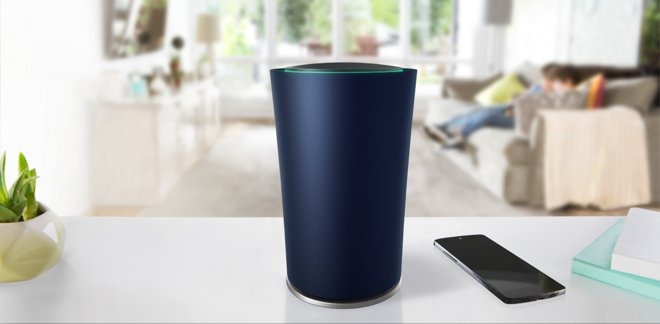A special Google team is reportedly developing a device that would integrate its search and voice assistant technology, much like the Amazon Echo.
Physically the product should resemble the company's OnHub Wi-Fi routers, sources told Re/code. The project is said to be codenamed "Chirp," although it's not known if a shipping name has been assigned.
The device isn't expected to launch during next week's Google I/O developer conference, but should arrive later this year. No other details have been leaked.
On a business level, the product is speculated to be a way for Google to further extend search, and by extension how it gathers demographic data for its core advertising business. Amazon is also estimated to have sold some 3 million Echos, which could make Google's entry more directly profitable.
The Echo line revolves around Amazon's "Alexa" voice assistant, which handles tasks like search, music playback, product/service orders, and smarthome functions. Google's device would presumably handle similar tasks, with the benefit of the company's more established voice and search technology. Alexa is a relatively new creation, and uses Microsoft's less popular Bing service for search.
Apple, of course, offers its own Siri voice-based personal assistant. And while newer devices offer handsfree "Hey Siri" support without the need for external power, Apple does not offer a standalone, always-listening piece of hardware to compete with the likes of Amazon's Echo.
 Roger Fingas
Roger Fingas








 Charles Martin
Charles Martin

 Malcolm Owen
Malcolm Owen
 William Gallagher
William Gallagher

 Christine McKee
Christine McKee
 Wesley Hilliard
Wesley Hilliard









36 Comments
These devices are handy, but who doesn't have their smartphone with them? What do I know.
Google fans have wanted their own Alexa for quite some time. While there is nothing wrong with this per se as it is relatively easy to do - just stick Google Now Voice on the firmware - my question is "why?" They are really going to compete with the 3 million Echo units that Amazon has pushed in nearly 2 years? They should be more concerned with making sure that Samsung and Facebook don't push them out of VR, as their Gear VR product is far superior to Google Cardboard: http://www.engadget.com/2016/05/11/million-gear-vr-users/ They should also try to rework their failed Android TV platform, as no manufacturers but Asus (for the original Nexus Player), Nvidia and Razer have come out with their own models, and the two biggest smart TV manufacturers - Samsung and LG - shunned it in favor of their own Tizen and WebOS, and the other manufacturers like Sony limited the platform to their most expensive TVs, leaving Google to try to partner with another company for Chromecast type functionality only for cheap TVs. Maybe coming out with a line of $35 dongles similar to the Fire TV stick and then practically giving the things away with a purchase of a new smartphone would actually work. Or perhaps their new hardware division should just manufacture their own TVs. Giving Android Wear - which has still yet to reach the 5 million in sales mark in nearly 2 years - yet another makeover that will allow the devices to be made a lot more cheaply and then practically given away with each smartphone should be done also. Another thing: why not just alter the Google Now API so you will be able to send voice commands over Chromecast and Chromecast Audio? Instead of selling a few speakers with Google Now enabled, use the Google Now that is already on 1 billion Android devices - and not a few iOS devices - to send search commands to the tens of millions of Chromecast and Google Cast Receiver-enabled devices that are in the wild. Why on earth would a software company emulate a poorly-selling hardware device when they can come up with a software solution that incorporates hardware that far more people already have? Eh. But that is Google for you ... so few of their ideas actually work.
I have practically every Apple device known to man in my house or on my person. What if they all could be invoked, Echo-style, at any time? Chances are one or more of them would always be in earshot, so no worries about not being in the "right" room or having to buy multiple Echo devices. How far could Apple be from accessing this functionality? Obviously on an opt-in basis.